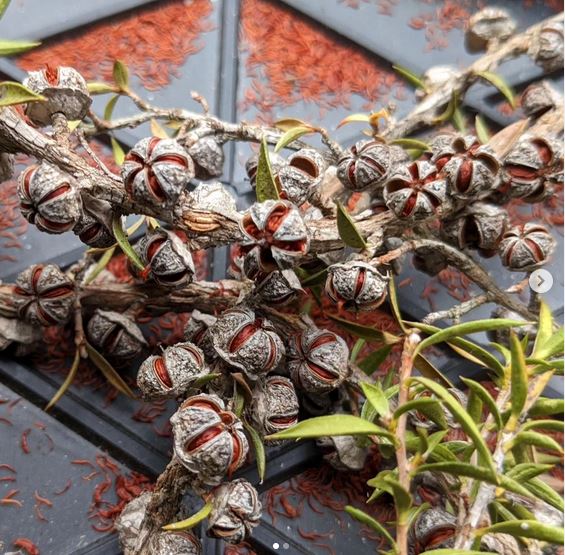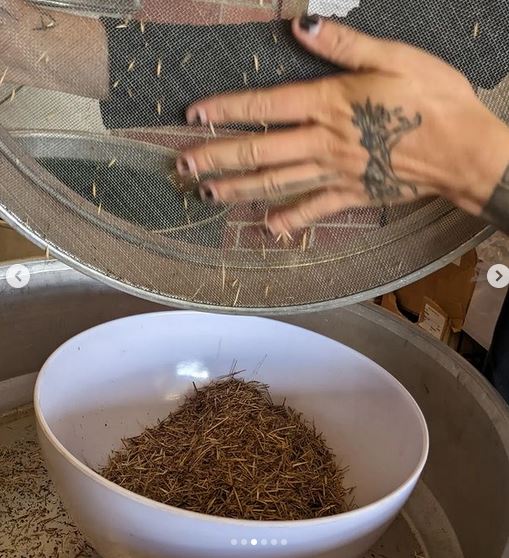The Op Shop assists Bili Nursery by supplying excess/lower quality pillow cases for collecting native seed. 

Bili Nursery is a part of Westgate Biodiversity - an organisation focussed on regenerating inner city vegetation and community education.
We produce around 150,000 plants per year for our local council projects, as well as initiatives for
K oala habitat restoration, climate change actions and educating local community members and school groups on environmentally friendly approaches to boost the local ecosystem.
oala habitat restoration, climate change actions and educating local community members and school groups on environmentally friendly approaches to boost the local ecosystem.
K
 oala habitat restoration, climate change actions and educating local community members and school groups on environmentally friendly approaches to boost the local ecosystem.
oala habitat restoration, climate change actions and educating local community members and school groups on environmentally friendly approaches to boost the local ecosystem.We really appreciate the help that Rotary Flemington has offered over the past 9 months and look forward to the upcoming seed collection season of summer 2023-24 with added enthusiasm as we will be well-supplied to get out into the environment and get to work.
Of the 300 or so species we grow annually, many are collected in very large quantities. For this work we usually rely on the help of volunteers and donated equipment, as well as jars, plastic containers, paper bags, tulle bags and pillow cases. Species which particularly require the pillow case technique include Eucalypts, Acacias (wattles), and large tree species like Bursaria, Banksia, Allocasuarina (She Oak) and more.
The pil low cases are used to capture enormous quantities of seed capsules/pods that are generally still held on the plants' branches, and then in a cool try location these capsules and pods may dry out and open up, with the seed caught in the bag itself.
low cases are used to capture enormous quantities of seed capsules/pods that are generally still held on the plants' branches, and then in a cool try location these capsules and pods may dry out and open up, with the seed caught in the bag itself.
 low cases are used to capture enormous quantities of seed capsules/pods that are generally still held on the plants' branches, and then in a cool try location these capsules and pods may dry out and open up, with the seed caught in the bag itself.
low cases are used to capture enormous quantities of seed capsules/pods that are generally still held on the plants' branches, and then in a cool try location these capsules and pods may dry out and open up, with the seed caught in the bag itself.This technique allows us to collect and grow distinct plant species in large numbers.
For instance we may be requested by local government to grow a plant, eg. Callistemon sieberi, from 3 different sites. One site may have the plant naturally growing on sandy soils with coastal spray, one site may have clay soils and frequent frosts, and one site may be a rich creekline in the inner city.
This would req uire us to collect the seed off this plant species from the three sites specified, all within specific timings of the year where this plant has seed available and ripe enough to collect.
uire us to collect the seed off this plant species from the three sites specified, all within specific timings of the year where this plant has seed available and ripe enough to collect.
One pillow case of branches from Callistemon sieberi may catch enough seed to grow 1000-5000 tubestock plants for following order seasons.
As all the plants grown by us end up back in the local ecosystem supporting biodiversity, and the areas own distinct climatic niches, being able to source this equipment for cheap means we can put our resources in to other areas of our organisation, like volunteer enrichment or free workshops.
For instance we may be requested by local government to grow a plant, eg. Callistemon sieberi, from 3 different sites. One site may have the plant naturally growing on sandy soils with coastal spray, one site may have clay soils and frequent frosts, and one site may be a rich creekline in the inner city.
This would req
 uire us to collect the seed off this plant species from the three sites specified, all within specific timings of the year where this plant has seed available and ripe enough to collect.
uire us to collect the seed off this plant species from the three sites specified, all within specific timings of the year where this plant has seed available and ripe enough to collect.One pillow case of branches from Callistemon sieberi may catch enough seed to grow 1000-5000 tubestock plants for following order seasons.
As all the plants grown by us end up back in the local ecosystem supporting biodiversity, and the areas own distinct climatic niches, being able to source this equipment for cheap means we can put our resources in to other areas of our organisation, like volunteer enrichment or free workshops.
